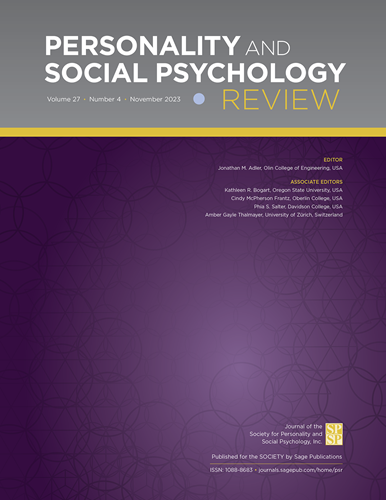超越好坏:人际关系的四个评价象限
IF 10.4
1区 心理学
Q1 PSYCHOLOGY, SOCIAL
引用次数: 0
摘要
学术摘要传统上,理论和实证都是从积极到消极的单一维度来考虑关系评价的。然而,在这项理论工作中,我们强调了使用关系评估的双向概念化的重要性,其中积极和消极的维度可以独立变化。在此过程中,我们描述了在人际关系中经历的四个评估象限,并概述了它们独特的人际过程和结果,无论是从经历它们的人的角度(即,行动者效应)还是从这些评估的接受者的角度(即,伙伴效应),并考虑了显性(即,协商)和隐性(即,自动)过程。我们还提供了一个框架来预测关系属性如何可能影响关系评估,我们引入了关系评估模型的轨迹(TREM),该模型描述了随着时间的推移评估的变化以及影响这种变化的因素。我们评价他人的方式对我们如何与他人相处以及我们的心理和身体健康有着重要的影响。然而,之前的研究主要集中在人际关系中的积极或消极评价上。但人们在恋爱中通常会经历另外两种评估:矛盾心理和冷漠。在这项工作中,我们认为研究关系中所有四种不同的评估类型(即主要是积极的,主要是消极的,矛盾的和冷漠的)是很重要的,因为它们各自独特地预测某些关系的动态和过程。我们讨论了这些不同类型的评估对进行评估的人和被评估的人的影响,我们还讨论了这些评估是如何影响审议过程和自动过程的。最后,我们提出了一个模型(TREM)的关系评价是如何随着时间的推移而演变的,以及影响评价变化的因素。本文章由计算机程序翻译,如有差异,请以英文原文为准。
Beyond Good or Bad: The Four Evaluative Quadrants of Relationships
Academic AbstractTraditionally, theoretical and empirical accounts have considered relationship evaluations along one single dimension ranging from positive to negative. However, in this theoretical work, we stress the importance of using a bi-dimensional conceptualization of relationship evaluations in which positive and negative dimensions can vary independently. In doing so, we describe the four evaluative quadrants experienced in relationships and outline their unique interpersonal processes and outcomes, both from the perspective of the person experiencing them (i.e., actor effects) and from the perspective of the recipient of such evaluations (i.e., partner effects) and considering both explicit (i.e., deliberative) and implicit (i.e., automatic) processes. We also provide a framework that predicts how relationship properties are likely to influence relationships evaluations, and we introduce the Trajectories of Relationship Evaluation Model (TREM) that describes changes in evaluations over time and the factors that influence such changes.Public AbstractThe way we evaluate other people has important implications for how we relate to others and for our psychological and physical health. However, previous research has mostly focused on positive or negative evaluations in relationships. But there are two other types of evaluations that people commonly experience in relationships: ambivalence and indifference. In this work, we argue that it is important to study all four different evaluative types in relationships (i.e., mostly positive, mostly negative, ambivalence, and indifference) because they each uniquely predict certain relationship dynamics and processes. We discuss the consequences of these different types of evaluations for the person who holds the evaluation and for the person who is the target of such evaluation, and we discuss how these evaluations affect both deliberative and automatic processes. Finally, we propose a model (TREM) of how relationship evaluations evolve over time and of the factors that influence the changes in evaluations.
求助全文
通过发布文献求助,成功后即可免费获取论文全文。
去求助
来源期刊

Personality and Social Psychology Review
PSYCHOLOGY, SOCIAL-
CiteScore
19.00
自引率
1.90%
发文量
20
期刊介绍:
Title: Personality and Social Psychology Review (PSPR)
Journal Overview:
Official journal of SPSP, the Society for Personality and Social Psychology, Inc.
Premiere outlet for original theoretical papers and conceptual review articles in all areas of personality and social psychology
Features stimulating conceptual pieces identifying new research directions and comprehensive review papers providing integrative frameworks for existing theory and research programs
Topics Covered:
Attitudes and Social Cognition: Examines the inner workings of the human mind in understanding, evaluating, and responding to the social environment
Interpersonal and Group Processes: Explores patterns of interaction and interdependence characterizing everyday human functioning
Intergroup Relations: Investigates determinants of prejudice, conflict, cooperation, and harmonious relationships between social groups
Personality and Individual Differences: Focuses on causes, assessment, structures, and processes giving rise to human variation
Biological and Cultural Influences: Studies the biological and cultural mediation of social psychological and personality processes
 求助内容:
求助内容: 应助结果提醒方式:
应助结果提醒方式:


